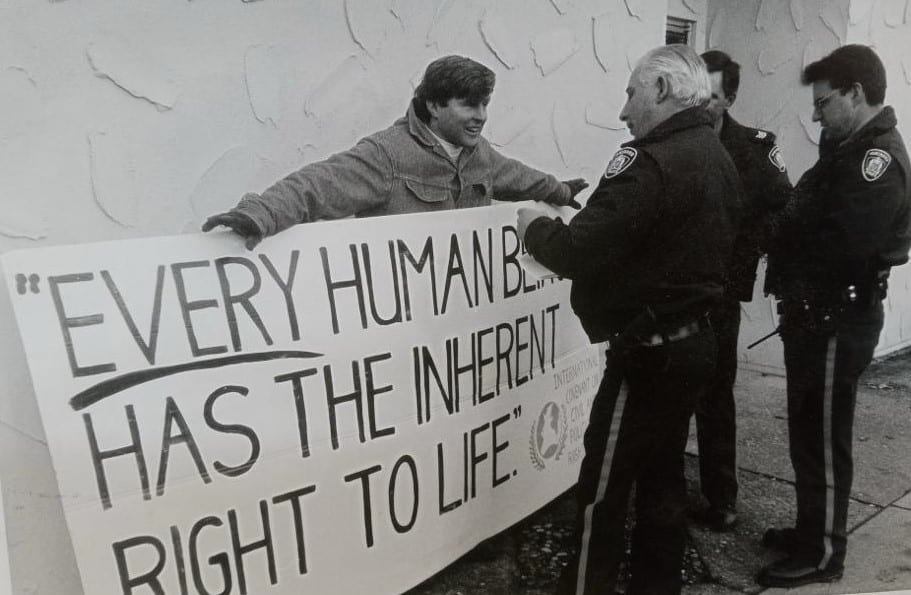- Jim Demers was criminally convicted and spent almost two months in prison in 1996-97 for holding a sign quoting the American Convention on Human Rights: “Every person has the right to have his life respected”
- With no recourse left in Canada, Demers filed for redress with the Inter-American Commission on Human Rights in 2004 and has waited twenty years for justice.
- ADF International now representing Demers after 20-year wait: “As we grapple with the spread of censorship across the globe, this case presents an opportunity for a key human rights watchdog to reassert the very rights they were established to defend”

WASHINGTON, DC (21 November 2024) Jim Demers, a lifelong resident of British Columbia, Canada, was criminally convicted and spent almost two months in prison in 1996-97 for standing silently on a public sidewalk outside of an abortion facility. He held a sign quoting Article Four of the American Convention on Human Rights: “Every person has the right to have his life respected. This right shall be protected by law and, in general, from the moment of conception.”
Demers was standing in a censorship zone around the facility, which bans expression critical of abortion.
Demers was criminally convicted for his peaceful expression, for which he was given a suspended sentence of two years, subject to the condition of not returning to the public area surrounding the abortion facility.
After failing to obtain redress from the Canadian Supreme Court, Demers took his case to the Inter-American Commission on Human Rights in 2004. The Commission admitted his case in 2006, but almost 20 years later, has yet to rule. In the face of this egregious failure to deliver timely justice, ADF International assumed representation of Demers.
“I hope I’m never silent when bad things are happening, and I hope nobody else is silent either when bad things are happening. I have dedicated my life to speaking out in defense of the unborn, and because of this, I was criminally convicted and even spent time in jail,” said Demers.
“I have waited for almost 20 years for the Inter-American Commission on Human Rights to rule on my unjust conviction over the exercise of my freedom, and that of all people, to stand up, speak truth, and defend those that cannot defend themselves. I am grateful to ADF International for its efforts to bring this ordeal to an end. I will continue to advocate for the right to life of every person and look forward to the day when I can speak up without fear of criminal prosecution and punishment in Canada.”
“All human rights are in peril when the fundamental right to free speech is ignored,” stated Tomás Henríquez, lead lawyer on this case for ADF International. “For peacefully expressing his pro-life views on a sidewalk outside of an abortion facility, Jim Demers was convicted as a criminal and forced to spend time behind bars with serious felons. Even if you disagree with Jim’s beliefs, everyone should defend his right to voice them without fear of criminal prosecution and imprisonment. Now is the time for the Inter-American Commission to exercise its authority to deliver justice for Jim.”
“All human rights are in peril when the fundamental right to free speech is ignored.”
Demers stood outside of an abortion facility in Vancouver, British Columbia before Christmas of 1996, holding a sign quoting Article Four of the American Convention on Human Rights. The Access to Abortion Services Act of British Columbia, in force to this day, establishes so-called “bubble zones” around abortion facilities, creating a censorship zone that bans free expression. Notably, the law imposes viewpoint discrimination, as it only penalizes expressions that are critical of abortion, but not others.
Demers stood silently on the sidewalk outside of the main entrance, never engaging verbally or otherwise with any member of the public or of the abortion facility, or impeding entrance to the facility in any way.
For this peaceful expression, Demers was arrested, placed in jail pending trial for seven weeks, alongside violent criminals, and was ultimately convicted on criminal charges.
Demers filed a petition against Canada in 2004 with the Inter-American Commission on Human Rights. The Commission agreed to rule on the merits of his case in 2006 as to whether it was lawful to use criminal sanctions against Demers for his peaceful expression. Almost twenty years later, the Commission has yet to decide his case, in what is perhaps the most egregious case of alleged backlog at any international human rights body.
“ADF International is proud to stand with Jim as he seeks justice in his case at the Inter-American Commission on Human Rights. The Commission has slept on Jim’s case for almost 20 years. We call on the Commission to rule decisively that these actions by Canadian authorities violated Jim’s fundamental right to freedom of speech,” Henríquez continued.
“Both international law and the Canadian Charter of Rights and Freedoms guarantee the fundamental right to freedom of expression. As we grapple with the spread of censorship across the globe, this case presents an opportunity for our human rights watchdogs to reassert the very rights they were established to defend.”
Images for free use in print or online in relation to this story only.




